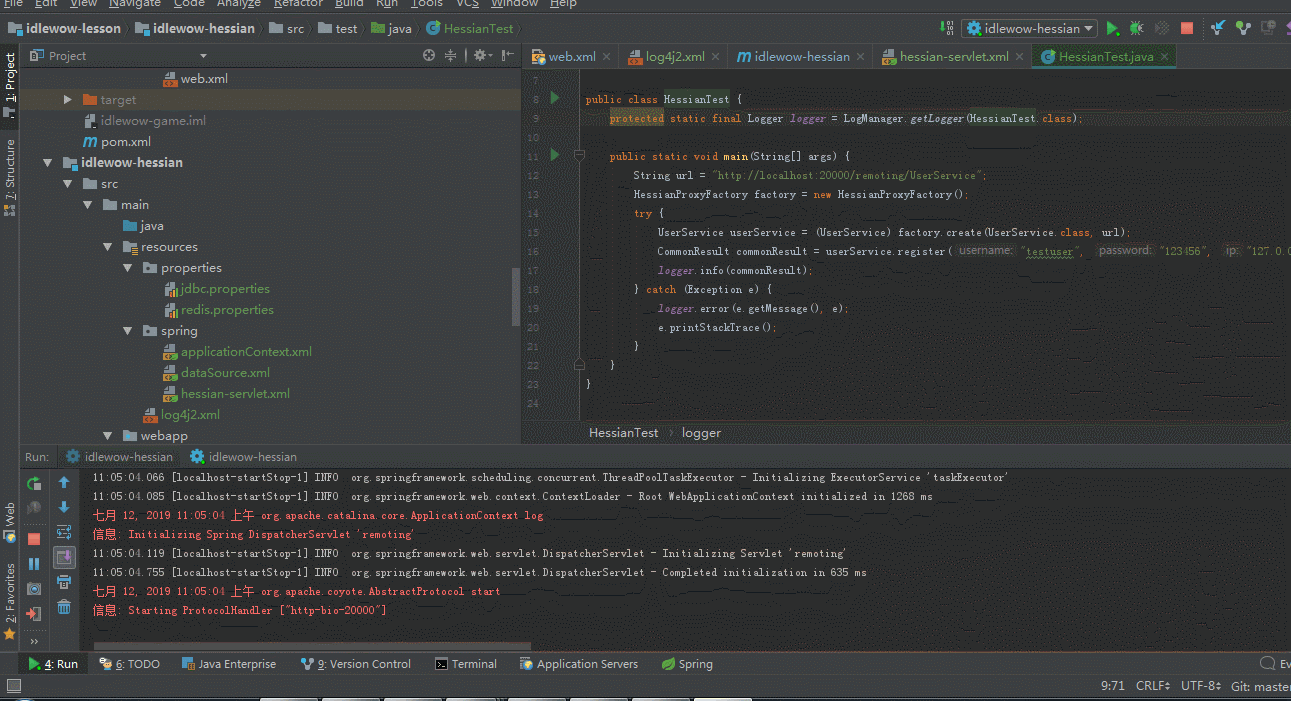前面实现RMS系统时,我们让其直接访问底层数据库。后面我们在idlewow-game模块实现游戏逻辑时,将不再直接访问底层数据,而是通过hessian服务暴露接口给表现层。
本章,我们先把hessian服务搭好,并做一个简单的测试,这里以用户注册接口为例。
先简单介绍下,实现hessian接口,只需要在facade模块暴露接口,然后在core模块实现接口,最后在hessain模块配置好接口路由,将其启动即可。
实现步骤
idlewow-facade
新建包com.idlewow.user.model,在此包下添加模型类:

package com.idlewow.user.model;
import com.idlewow.common.model.BaseModel;
import lombok.Data;
import java.io.Serializable;
@Data
public class UserAccount extends BaseModel implements Serializable {
private String username;
private String password;
private String mail;
private String phone;
private String realName;
private String idNo;
private Integer status;
private String remark;
private String registerIp;
}
新建包com.idlewow.user.service,在此包下添加接口类:

package com.idlewow.user.service;
import com.idlewow.common.model.CommonResult;
public interface UserService {
CommonResult register(String username, String password, String ip);
CommonResult login(String username, String password);
}
idlewow-core
新建包com.idlewow.user.mapper,添加mapper文件:

package com.idlewow.user.mapper;
import com.idlewow.user.model.UserAccount;
public interface UserAccountMapper {
int register(UserAccount userAccount);
UserAccount login(UserAccount userAccount);
UserAccount findByUsername(String username);
}

<?xml version="1.0" encoding="UTF-8"?>
<!DOCTYPE mapper PUBLIC "-//mybatis.org//DTD Mapper 3.0//EN" "http://mybatis.org/dtd/mybatis-3-mapper.dtd">
<mapper namespace="com.idlewow.user.mapper.UserAccountMapper">
<resultMap id="BaseResultMap" type="com.idlewow.user.model.UserAccount">
<result column="id" property="id"/>
<result column="username" property="username"/>
<result column="password" property="password"/>
<result column="mail" property="mail"/>
<result column="phone" property="phone"/>
<result column="real_name" property="realName"/>
<result column="id_no" property="idNo"/>
<result column="status" property="status"/>
<result column="remark" property="remark"/>
<result column="register_ip" property="registerIp"/>
<result column="create_user" property="createUser"/>
<result column="update_user" property="updateUser"/>
<result column="create_time" property="createTime"/>
<result column="update_time" property="updateTime"/>
<result column="is_delete" property="isDelete"/>
<result column="version" property="version"/>
</resultMap>
<!-- 注册 -->
<insert id="register">
insert into user_account (username, password, register_ip, create_user)
values (#{username}, #{password}, #{registerIp}, #{createUser})
</insert>
<!-- 登陆 -->
<select id="login" resultMap="BaseResultMap">
select *
from user_account
where username = #{username} and password = #{password} and is_delete = 0
</select>
<!-- id查询 -->
<select id="find" resultMap="BaseResultMap">
select *
from user_account
where id = #{id} and is_delete = 0
</select>
<!-- 根据用户名查找用户 -->
<select id="findByUsername" resultMap="BaseResultMap">
select *
from user_account
where username = #{username} and is_delete = 0
</select>
<!-- 列表查询总数 -->
<select id="count" resultType="int">
select count(1)
from map_mob
<where>
is_delete = 0
<if test="mapId != null">
and map_id = #{mapId}
</if>
<if test="faction != null">
and faction = #{faction}
</if>
<if test="mobClass != null">
and mob_class = #{mobClass}
</if>
<if test="mobType != null">
and mob_type = #{mobType}
</if>
<if test="levelStart != null">
and level >= #{levelStart}
</if>
<if test="levelEnd != null">
and level <= #{levelEnd}
</if>
<if test="name != null and name != ''">
and name like concat('%', #{name}, '%')
</if>
</where>
</select>
<!-- 列表查询 -->
<select id="list" resultMap="BaseResultMap">
select *
from map_mob
<where>
is_delete = 0
<if test="mapId != null">
and map_id = #{mapId}
</if>
<if test="faction != null">
and faction = #{faction}
</if>
<if test="mobClass != null">
and mob_class = #{mobClass}
</if>
<if test="mobType != null">
and mob_type = #{mobType}
</if>
<if test="levelStart != null">
and level >= #{levelStart}
</if>
<if test="levelEnd != null">
and level <= #{levelEnd}
</if>
<if test="name != null and name != ''">
and name like concat('%', #{name}, '%')
</if>
</where>
<if test="pageParam != null">
limit ${(pageParam.pageIndex - 1) * pageParam.pageSize}, ${pageParam.pageSize}
</if>
</select>
</mapper>
新建com.idlewow.user.manager包,添加manager类:

package com.idlewow.user.manager;
import com.idlewow.user.mapper.UserAccountMapper;
import com.idlewow.user.model.UserAccount;
import org.springframework.beans.factory.annotation.Autowired;
import org.springframework.stereotype.Component;
@Component
public class UserAccountManager {
@Autowired
UserAccountMapper userAccountMapper;
public UserAccount findByUsername(String username) {
return userAccountMapper.findByUsername(username);
}
public void register(String username, String password, String ip) {
UserAccount userAccount = new UserAccount();
userAccount.setUsername(username);
userAccount.setPassword(password);
userAccount.setRegisterIp(ip);
userAccount.setCreateUser("idlewow");
int effected = userAccountMapper.register(userAccount);
if (effected == 0) {
throw new RuntimeException("sql effected 0 rows");
}
}
public UserAccount login(String username, String password) {
UserAccount userAccount = new UserAccount();
userAccount.setUsername(username);
userAccount.setPassword(password);
return userAccountMapper.login(userAccount);
}
}
新建com.idlewow.user.service.impl包,添加接口的实现类:

package com.idlewow.user.service.impl;
import com.idlewow.common.model.CommonResult;
import com.idlewow.user.manager.UserAccountManager;
import com.idlewow.user.model.UserAccount;
import com.idlewow.user.service.UserService;
import org.apache.logging.log4j.LogManager;
import org.apache.logging.log4j.Logger;
import org.springframework.beans.factory.annotation.Autowired;
import org.springframework.stereotype.Service;
@Service("userService")
public class UserServiceImpl implements UserService {
private final Logger logger = LogManager.getLogger(this.getClass().getName());
@Autowired
UserAccountManager userAccountManager;
public CommonResult register(String username, String password, String ip) {
try {
UserAccount userAccount = userAccountManager.findByUsername(username);
if (userAccount != null) {
return CommonResult.fail("此用户名已被注册!");
}
userAccountManager.register(username, password, ip);
return CommonResult.success();
} catch (Exception ex) {
logger.error("用户注册失败:" + ex.getMessage(), ex);
return CommonResult.fail("用户注册失败");
}
}
@Override
public CommonResult login(String username, String password) {
try {
UserAccount userAccount = userAccountManager.login(username, password);
if (userAccount == null) {
return CommonResult.fail("用户名或密码错误!");
}
if (userAccount.getStatus() == 1) {
return CommonResult.fail("账号已冻结!");
}
return CommonResult.success("", userAccount);
} catch (Exception ex) {
logger.error("用户登录失败:" + ex.getMessage(), ex);
return CommonResult.fail("用户登录失败");
}
}
}
注意,这里ServiceImple类上面有个注解 @Service("userService")。后面我们再添加这种对外的服务类时,都要加这个注解。
idlewow-hessian
hessian用于服务(器)间通信,实际上也是由一个DispatherServlet接收请求,并转发到各个Service中处理,和springmvc差不多,只不过返回的是二进制数据,而不是视图。我们在pom下添加下列依赖,可以发现依赖的包和mvc差不多。另外,作为启动项目,在plugins节点下,我们配置了启动插件tomcat7以及启动端口20000。

<?xml version="1.0" encoding="UTF-8"?>
<project xmlns="http://maven.apache.org/POM/4.0.0"
xmlns:xsi="http://www.w3.org/2001/XMLSchema-instance"
xsi:schemaLocation="http://maven.apache.org/POM/4.0.0 http://maven.apache.org/xsd/maven-4.0.0.xsd">
<parent>
<artifactId>idlewow</artifactId>
<groupId>idlewow</groupId>
<version>1.0-SNAPSHOT</version>
</parent>
<modelVersion>4.0.0</modelVersion>
<artifactId>idlewow-hessian</artifactId>
<packaging>war</packaging>
<dependencies>
<dependency>
<groupId>idlewow</groupId>
<artifactId>idlewow-facade</artifactId>
<version>1.0-SNAPSHOT</version>
</dependency>
<dependency>
<groupId>idlewow</groupId>
<artifactId>idlewow-core</artifactId>
<version>1.0-SNAPSHOT</version>
</dependency>
<dependency>
<groupId>com.caucho</groupId>
<artifactId>hessian</artifactId>
<version>4.0.60</version>
</dependency>
<dependency>
<groupId>org.springframework</groupId>
<artifactId>spring-context</artifactId>
<version>5.1.6.RELEASE</version>
</dependency>
<dependency>
<groupId>org.springframework</groupId>
<artifactId>spring-context-support</artifactId>
<version>5.1.6.RELEASE</version>
</dependency>
<dependency>
<groupId>org.springframework</groupId>
<artifactId>spring-core</artifactId>
<version>5.1.6.RELEASE</version>
</dependency>
<dependency>
<groupId>org.springframework</groupId>
<artifactId>spring-web</artifactId>
<version>5.1.6.RELEASE</version>
</dependency>
<dependency>
<groupId>org.springframework</groupId>
<artifactId>spring-webmvc</artifactId>
<version>5.1.6.RELEASE</version>
</dependency>
<dependency>
<groupId>org.springframework</groupId>
<artifactId>spring-aop</artifactId>
<version>5.1.6.RELEASE</version>
</dependency>
<dependency>
<groupId>org.springframework</groupId>
<artifactId>spring-jdbc</artifactId>
<version>5.1.6.RELEASE</version>
</dependency>
<dependency>
<groupId>org.springframework</groupId>
<artifactId>spring-tx</artifactId>
<version>5.1.6.RELEASE</version>
</dependency>
<dependency>
<groupId>javax.servlet</groupId>
<artifactId>javax.servlet-api</artifactId>
<version>4.0.1</version>
<scope>provided</scope>
</dependency>
<dependency>
<groupId>org.aspectj</groupId>
<artifactId>aspectjweaver</artifactId>
<version>1.9.3</version>
</dependency>
<dependency>
<groupId>org.mybatis</groupId>
<artifactId>mybatis-spring</artifactId>
<version>2.0.1</version>
</dependency>
<dependency>
<groupId>org.apache.commons</groupId>
<artifactId>commons-dbcp2</artifactId>
<version>2.6.0</version>
</dependency>
</dependencies>
<build>
<plugins>
<plugin>
<groupId>org.apache.maven.plugins</groupId>
<artifactId>maven-compiler-plugin</artifactId>
<configuration>
<source>1.8</source>
<target>1.8</target>
</configuration>
</plugin>
<plugin>
<groupId>org.apache.tomcat.maven</groupId>
<artifactId>tomcat7-maven-plugin</artifactId>
<version>2.2</version>
<configuration>
<uriEncoding>UTF-8</uriEncoding>
<port>20000</port>
<path>/</path>
</configuration>
</plugin>
<plugin>
<groupId>org.apache.maven.plugins</groupId>
<artifactId>maven-war-plugin</artifactId>
<version>2.6</version>
</plugin>
</plugins>
</build>
</project>
然后,我们需要在web.xml中配置hessian的servlet,以及添加一个字符编码的filter等等,如下:

<?xml version="1.0" encoding="UTF-8"?>
<web-app xmlns:xsi="http://www.w3.org/2001/XMLSchema-instance" xmlns="http://java.sun.com/xml/ns/javaee"
xsi:schemaLocation="http://java.sun.com/xml/ns/javaee http://java.sun.com/xml/ns/javaee/web-app_3_0.xsd"
version="3.0">
<context-param>
<param-name>contextConfigLocation</param-name>
<param-value>classpath:spring/applicationContext.xml</param-value>
</context-param>
<listener>
<listener-class>org.springframework.web.context.ContextLoaderListener</listener-class>
</listener>
<filter>
<filter-name>CharacterEncodingFilter</filter-name>
<filter-class>org.springframework.web.filter.CharacterEncodingFilter</filter-class>
<init-param>
<param-name>encoding</param-name>
<param-value>utf-8</param-value>
</init-param>
</filter>
<filter-mapping>
<filter-name>CharacterEncodingFilter</filter-name>
<url-pattern>/remoting/*</url-pattern>
</filter-mapping>
<servlet>
<servlet-name>remoting</servlet-name>
<servlet-class>org.springframework.web.servlet.DispatcherServlet</servlet-class>
<init-param>
<param-name>contextConfigLocation</param-name>
<param-value>classpath:spring/hessian-servlet.xml</param-value>
</init-param>
<load-on-startup>2</load-on-startup>
</servlet>
<servlet-mapping>
<servlet-name>remoting</servlet-name>
<url-pattern>/remoting/*</url-pattern>
</servlet-mapping>
</web-app>
在/resource/spring目录下,新建hessian服务的配置文件hessian-servlet.xml。这个xml主要配置对外暴露的hessian服务。现在我们只配置了UserService,后面每次添加对外的服务接口时,都需要在这里添加配置。

<beans xmlns="http://www.springframework.org/schema/beans"
xmlns:xsi="http://www.w3.org/2001/XMLSchema-instance"
xmlns:mvc="http://www.springframework.org/schema/mvc"
xsi:schemaLocation="
http://www.springframework.org/schema/beans
http://www.springframework.org/schema/beans/spring-beans-3.1.xsd
http://www.springframework.org/schema/mvc
http://www.springframework.org/schema/mvc/spring-mvc-3.1.xsd
">
<mvc:annotation-driven/>
<bean name="/UserService" class="org.springframework.remoting.caucho.HessianServiceExporter">
<property name="service" ref="userService"/>
<property name="serviceInterface" value="com.idlewow.user.service.UserService"/>
</bean>
</beans>
除了这3个配置外,还需要配置applicationContext.xml, jdbc.propetries, dataSource.xml, log4j2.xml,和RMS系统大体一致,这里就不再重复了。具体可在源码中查看。
全部搞定后,只要把hessian项目启动,即可调用hessian接口了。启动步骤和rms一样,maven命令也是tomcat7:run,工作目录切换到hessian目录下即可。
运行效果
在game模块中调用hessian时,也是通过在xml中配置注入的方式调用。这里我们还没开始写game模块,为了测试,先简单写一个入口类(即带main函数的类)调用。类似于C#中写控制台程序调用。
在/src/test/java包下新建一个类HessianTest.java如下:

import com.caucho.hessian.client.HessianProxyFactory;
import com.idlewow.common.model.CommonResult;
import com.idlewow.user.service.UserService;
import org.apache.logging.log4j.LogManager;
import org.apache.logging.log4j.Logger;
public class HessianTest {
protected static final Logger logger = LogManager.getLogger(HessianTest.class);
public static void main(String[] args) {
String url = "http://localhost:20000/remoting/UserService";
HessianProxyFactory factory = new HessianProxyFactory();
try {
UserService userService = (UserService) factory.create(UserService.class, url);
CommonResult commonResult = userService.register("testuser", "123456", "127.0.0.1");
logger.info(commonResult);
} catch (Exception e) {
logger.error(e.getMessage(), e);
e.printStackTrace();
}
}
}
在这个类中,我们指定hessian服务地址,并利用代理工厂创建一个服务代理。然后调用用户注册方法。测试的时候,先把hessian项目启动。然后执行这个main方法即可。
运行效果如下图,可以看到,接口调用成功,并把执行结果在日志中打印了出来。

小结
本节把hessian服务搭建运行起来,并实现了用户注册登录的接口。后面game模块凡是访问底层数据,均需调用hessian服务。
本章源码下载:https://idlestudio.ctfile.com/fs/14960372-387256708
本文原文地址:https://www.cnblogs.com/lyosaki88/p/idlewow_10.html

来源:https://www.cnblogs.com/lyosaki88/p/idlewow_10.html
